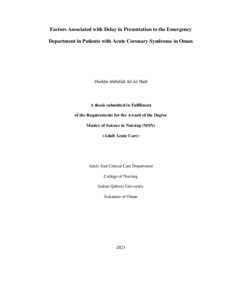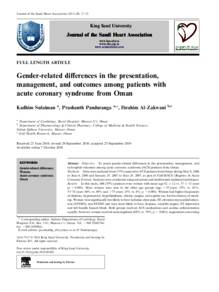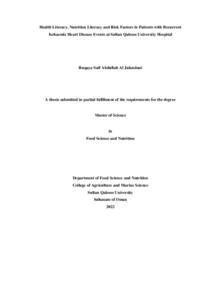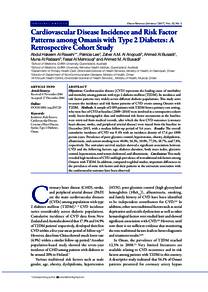Document
Factors associated with delay in presentation to the Emergency Department in patients with acute coronary syndrome in Oman.
Source
Master's thesis
Country
Oman
City
Muscat
Publisher
Sultan Qaboos University
Gregorian
2023
Language
English
Thesis Type
Master's thesis
English abstract
Pre-hospital delay is the leading cause of poor prognosis in acute coronary syndrome
patients. However, the factors behind that delay are not fully highlighted. This study aimed
to assess the pre-hospital delay and identify the factors associated with delay in
presentation to the Emergency Department (ED) in patients with acute coronary syndrome
in Oman.
Method:
A cross-sectional study design was used, and a convenience sample of 122 out of 125
patients was recruited from three EDs in Oman. A questionnaire was used to obtain data
on factors associated with pre-hospital from patients received through the ED and
admitted to medical wards. Medical variables were retrieved from medical records.
Descriptive statists were used to describe the sociodemographic characteristics, symptoms
& perceived symptoms, clinical characteristics, knowledge, attitude, and belief levels
among patients with Acute Coronary Syndrome (ACS) and pre-hospital delay time.
Independent T test was employed to examine the differences in knowledge, attitudes, and
beliefs about ACS with pre-hospital delay. Stepwise Linear regression analysis evaluated
the associated factors with the pre-hospital delay.
Results:
The study revealed various results based on the statistical evaluation conducted on the
responses. Among patients diagnosed with ACS between July and November 2022, 122
agreed to participate in the study (response rate = 97.6%). The mean age was 58.4. Most
patients (73%) were males and married (82.8%). The median pre-hospital time to decide
to go to ED was 7.5 hours & time to reach ED was 8.7 hours. Most patients (59%)
perceived their symptoms as non-cardiac. The mean scores of knowledge, attitude, and
belief about ACS were 16.4, 12.8, and 23.8, respectively. The pre-hospital delay was
significantly associated with knowledge, attitude, and beliefs, with p-values of 0.017,
0.016, and 0.000, respectively.
Conclusion:
The findings revealed that longer delays were substantially associated with patients'
knowledge, attitudes, and beliefs. That indicates most patients have poor knowledge,
attitudes, and beliefs about ACS symptoms. There should be organized teaching initiatives
regarding the alarming signs of ACS & public awareness campaigns. A nurse-led
education program is valuable for educating patients and the public about ACS.
Category
Theses and Dissertations




